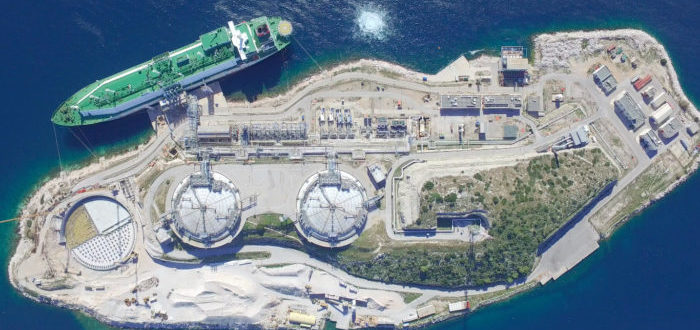Greece launched a new LNG tank to enhance its storage capacity and boost its ambitions to become a key regional energy hub. The new tank was launched on the LNG terminal on Revithoussa island, increasing its total storage capacity by 73% to 225,000 cubic metres.
A new LNG tank has been inaugurated at the Revithoussa terminal in Attica, Greece in order to expand its storage capacity and reinforce its ambitions to become an important energy hub of the region.
According to Reuters, Greece, which relies on Russian gas for its energy needs, has said it expects 4 billion euros in investments by 2030 in gas pipelines, networks and storage facilities.
Greek’s natural gas network and the country’s only LNG terminal, located on the island of Revithoussa, is operated by DESFA.
By the end of the year, Italy’s Snam is expected to buy a majority stake in DESFA after a European consortium, consisting of Snam, Enagás and Fluxys, was signed on July.
The third tank on the LNG terminal on Revithoussa will be put into commercial operation in a month from now and will increase its total storage capacity from 130,000 to 225,000 cubic metres and boost the gasification rate by 40%, allowing Greece to receive larger LNG cargoes.
According to the Greek Energy Minister, George Stathakis, the project is part of an attempt by Greece to become a key hub in the region, creating new data in the natural gas market.
Besides Russia, Algeria exports LNG to Greece, which it is temporarily stored at Revithoussa before it is gasified to supply the transmission system.
Moreover, Greece is developing a second LNG terminal off Alexandroupolis that aims to supply gas to southeastern Europe via a pipeline link with Bulgaria, the Interconnector Greece-Bulgaria (IGB).
The IGB and the LNG terminal will connect with the Trans-Adriatic Pipeline (TAP), which is under construction to transport Caspian gas to European markets.
With the upgrading, the transforming character of DESFA into an exporter is obvious, as from 7 billion cubic meters which is the total gas capacity of DESFA, 2 billion is sufficient for the internal market, while 5 billion can be directed to the Balkans and Ukraine.
In addition, the upgrade will allow the import of LNG from the USA and, in the future, from Israel and Cyprus.


























































